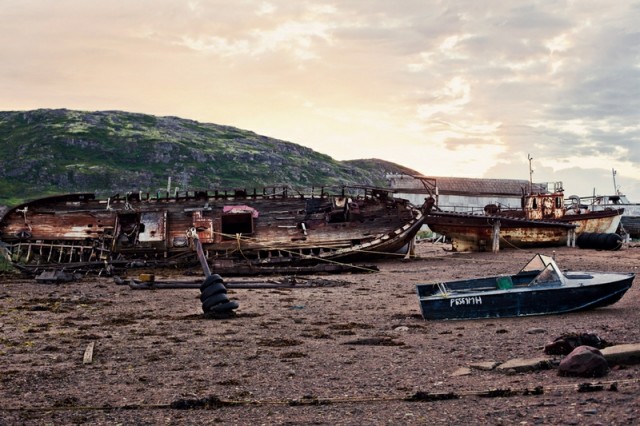[youtubes]https://www.youtube.com/watch?v=2oo7H25kirk[/youtubes]
It's not The Sound of Music, but don't let that put anyone off; I and the rest of my family were gripped by it. Coming home, the banal question - "what did you think of it?" - to which the immediate, incontestable response is that it was very moving. I then digressed, temporarily evading the question, to comment on the light - of the high northern latitudes where it was shot, cold but beautiful, with ice scoured rock, scant vegetation, no trees, and relics of human encroachment left around

suggesting we don't really belong up there.
I should also say that the acting was great - I guess that's part of why the film worked as a human story. There was also a bit of film technique which I'd not registered before - using the theatre sound system to have voices come from somewhere in the audience - so off stage. It worked as a device, and I'm sure was meant to be unsettling.
But I don't think I have much to say about the technical side of film, so since then, I've been reading reviews and thinking about why the director made this film, which at one level is just a tale of small town corruption. Some of the reviews - e.g. this from Variety - see it principally as anti-Putin satire, having first acknowledged that the director Andrey Zvyagintsev had described it as "a loose retelling of the Book of Job". I'd not realised that the idea of Leviathan entered our culture via the Book of Job, which I've never actually read; for me it has been rather the challenging idea of Hobbes that civilised life requires subordination to some kind of political monster - the Leviathan. And according to this review in the Guardian, Zvyagintsev also recognises that as partly what he meant.
As a thorough going Western liberal, I can't but think about how reform could improve the society depicted, but I think the Variety review misses something by concluding
because he offers an answer of sorts - a religious one - which we Western liberals find hard to take seriously. Towards the end of the film an Orthodox priest preaches a sermon which speaks directly about central Christian messages of truth, compassion and justice, and asserts that “Freedom is knowing God’s truth". Although undercut by the irony of this religion supporting the corruption, in particular the corrupt Mayor assuring his son that God sees everything, the words remain, and I think are to be understood. There is also a character, far from admirable, who is questioned a couple of times about whether he believes in God, but is irritated by the question, and impatiently asserts his belief in facts only. Definitely not the message we are meant to take, so I suspect that a Russian might take from this a partial answer, which is to believe in God.Without calling for outright reform, Zvyagintsev’s version questions how long a man can go on believing in a system that offers no better.
I wonder also what Zvyagintsev’s attitude to Hobbes' Leviathan might be. The Guardian reviewer comments that the film "starts off looking like a reasonably scaled drama about a little guy taking on big government", but in fact, it's small time government which is the problem here - and it's a problem Hobbes would have recognised. The whole point of his Leviathan was to eliminate the anarchy of neighbours tyrannising over each other when they can. It assumes a darker view of human nature than most in the West feel comfortable with, even though it lies at the base of the mainstream current of our political theory which derives from Hobbes. In Russia, in contrast, the need for a strong central authority figure - a Putin, even a Stalin - is not so unusual an attitude.